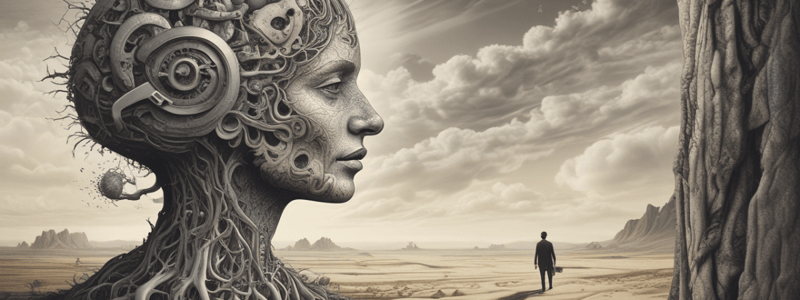Podcast
Questions and Answers
What term refers to the separation of awareness from everything besides what one is centrally focused on?
What term refers to the separation of awareness from everything besides what one is centrally focused on?
- Implicit Associations Test (IAT)
- Dissociation (correct)
- Priming
- Effortful attention
According to Freudian theory, dreams represent which of the following?
According to Freudian theory, dreams represent which of the following?
- Careful decision making
- Taboo or troublesome wishes or desires (correct)
- Nonconscious attempts to make sense of daily experiences
- Reduced peripheral awareness
Which substance category includes substances that slow down the body's physiology and mental processes?
Which substance category includes substances that slow down the body's physiology and mental processes?
- Depressants (correct)
- Opioids
- Stimulants
- Hallucinogens
What phenomenon is characterized by reduced peripheral awareness and increased focus on a singular stimulus?
What phenomenon is characterized by reduced peripheral awareness and increased focus on a singular stimulus?
Which state of consciousness is influenced by circadian rhythm and changes in brain activity across different stages?
Which state of consciousness is influenced by circadian rhythm and changes in brain activity across different stages?
Franz Mesmer is often credited with the discovery of which state of consciousness phenomenon?
Franz Mesmer is often credited with the discovery of which state of consciousness phenomenon?
Which of the following is NOT a model of selective attention?
Which of the following is NOT a model of selective attention?
What is the primary function of dreams, according to Freud's contribution?
What is the primary function of dreams, according to Freud's contribution?
Which psychoactive drug class is characterized by speeding up the body's physiological and mental processes?
Which psychoactive drug class is characterized by speeding up the body's physiological and mental processes?
Which sleep disorder is characterized by extreme daytime sleepiness with frequent episodes of nodding off?
Which sleep disorder is characterized by extreme daytime sleepiness with frequent episodes of nodding off?
Which of the following is NOT a common source of psychoactive drugs?
Which of the following is NOT a common source of psychoactive drugs?
What is the main difference between Broadbent's Model and Treisman's Attenuation Model of selective attention?
What is the main difference between Broadbent's Model and Treisman's Attenuation Model of selective attention?
Study Notes
States of Consciousness
- Consciousness is defined as our subjective awareness of ourselves and our environment (Koch, 2004).
- Dualism is the idea that the mind, a nonmaterial entity, is separate from the physical body but connected to it, as proposed by Rene Descartes.
Levels of Awareness
- Low awareness examples include:
- "The cocktail party" effect
- Implicit Associations Test (IAT)
- Priming
- High awareness examples include:
- Effortful attention
- Careful decision making
- Mindfulness
Other States of Consciousness
- Hypnosis is an actual phenomenon characterized by reduced peripheral awareness and increased focus on a singular stimulus, often credited to Franz Mesmer.
- Dissociation is the separation of awareness from everything besides what one is centrally focused on, involving being less effortful and less self-conscious about one's thoughts and behaviors.
- Sleep is a unique state of consciousness characterized by reduced awareness but active brain function, influenced by circadian rhythm and changes in brain activity across different stages.
Dreams
- Dreams are nonconscious attempts to make sense of daily experiences.
- Freudian theory suggests dreams represent taboo or troublesome wishes or desires.
Psychoactive Drugs
- Hallucinogens are substances that alter perceptions, often creating visions or hallucinations that are not real.
- Depressants are substances that slow down the body's physiology and mental processes.
- Stimulants are substances that speed up the body's physiological and mental processes.
Selective Attention
- Selective attention is the ability to choose certain stimuli in the environment for processing while ignoring distracting information.
- Models of selective attention include:
- Broadbent's Model: Selection based on physical features
- Treisman's Attenuation Model: Late selection model where all information in the unattended ear is processed based on meaning
- Multimode Model: Selection stage can change depending on the task
- Johnston and Heinz's findings suggest that under certain conditions, early selection is possible, and unattended content is minimally processed.
Sleeping and Dreaming
- Sleep is influenced by ambient light.
- Sleep disorders include:
- Insomnia: Persistent difficulty falling or staying asleep
- Sleep Apnea: Characterized by pauses in breathing that last at least 10 seconds during sleep
- Narcolepsy: Extreme daytime sleepiness with frequent episodes of nodding off
- Sleep Terrors: Disruptive sleep disorder, often experienced in childhood, involving sudden episodes of intense fear or terror during sleep
- Bruxism: Teeth grinding during sleep
- Periodic Limb Movement Disorder: Involves sudden involuntary movement of limbs during sleep
- Age sleep needs vary from newborns to adults.
- Lack of sleep impacts health and longevity, and is essential for healing and reducing anxiety.
Altering Consciousness with Psychoactive Drugs
- Psychoactive drugs alter states of consciousness, impacting perceptions and moods.
- Common sources of psychoactive drugs include:
- Everyday items like chocolate, coffee, soft drinks, and alcohol
- Medication (e.g., sleeping pills, tranquilizers)
- Recreational use
- The primary classes of psychoactive drugs are:
- Stimulants
- Depressants
- Opioids
- Hallucinogens
- Psychoactive drugs influence neurotransmitters, which can impact mood, perception, and behavior.
Studying That Suits You
Use AI to generate personalized quizzes and flashcards to suit your learning preferences.
Description
Learn about the concept of consciousness, including definitions and the idea of dualism proposed by Rene Descartes. Explore different levels of awareness such as low awareness with examples like the 'cocktail party' effect, Implicit Associations Test (IAT), and Priming, as well as high awareness with examples like effortful attention and careful decision making.




